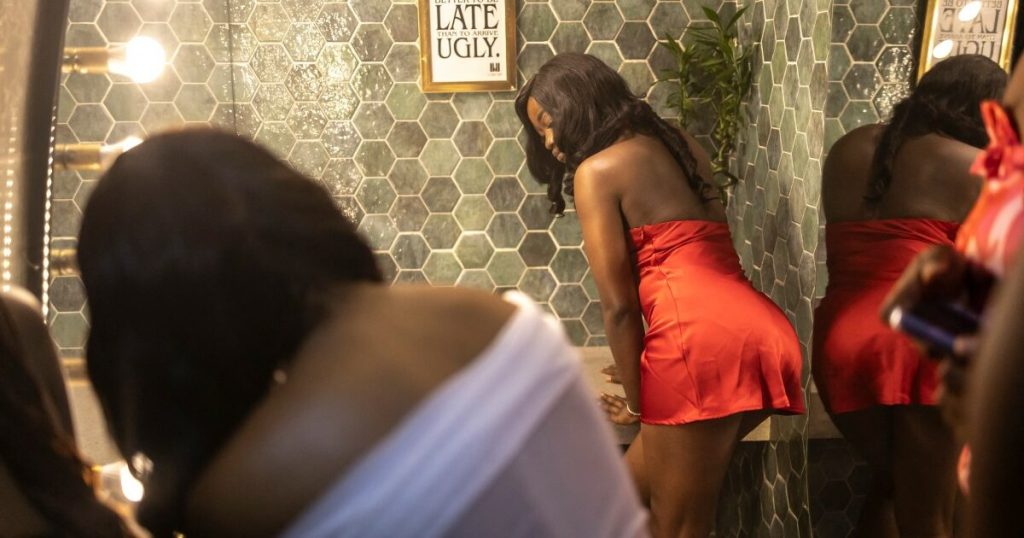The humble bathroom has undergone a dramatic transformation in Nigeria’s vibrant nightlife scene, evolving from a purely functional space into a meticulously designed backdrop for the ubiquitous selfie. Across the country, from the bustling metropolis of Lagos to the more reserved city of Kano, bars and clubs are investing in opulent restroom renovations, recognizing their potential to attract customers and generate social media buzz. This trend transcends geographical and cultural differences, uniting Nigerians in their shared appreciation for a well-curated selfie moment. The strategy is simple yet effective: create a visually stunning space that encourages patrons to capture and share their experiences, thereby providing free advertising for the establishment.
The aesthetics of these “selfie bathrooms” vary but often incorporate luxurious materials like marble and gold, along with ample mirrors and carefully calibrated lighting. Some establishments have elevated the experience beyond mere aesthetics, offering complimentary champagne or other perks designed to enhance the selfie-taking ritual. Zaza, a popular Lagos nightclub, exemplifies this approach with its champagne button, providing a touch of whimsy and further incentivizing patrons to document their visit. The focus is on creating an immersive and shareable experience, transforming the bathroom into an extension of the club’s overall ambiance.
For patrons, these glamorous restrooms offer a stage for self-expression and social connection. Women, in particular, are drawn to the opportunity to primp, pose, and capture their carefully curated looks. The bathroom selfie has become an integral part of the going-out experience, allowing individuals to showcase their style and participate in a shared cultural practice. The multiple mirrors and thoughtfully designed backgrounds provide opportunities for creative self-portraits, catering to the desire for unique and engaging content. Influencers, with their substantial online followings, play a key role in amplifying this trend, further cementing the bathroom selfie as a staple of Nigerian nightlife culture.
While the mirror selfie is a well-established global phenomenon, Nigeria’s nightlife scene has reimagined it with a distinct flair for extravagance and showmanship. Lagos, with its vibrant and trend-setting culture, has been at the forefront of this movement, but the trend has spread to other cities like Abuja and Kano, demonstrating its broad appeal. This adaptation of a global trend highlights Nigeria’s unique ability to embrace and elevate cultural practices, injecting them with local flavor and exuberance. The bathroom selfie, in this context, becomes more than just a fleeting trend; it’s a reflection of Nigeria’s dynamic social scene and its embrace of digital self-expression.
The competition among establishments to create the most Instagram-worthy restroom has sparked a friendly rivalry, with some claiming to be the originators of the trend. Rococo, a Lagos cabaret bar, asserts its pioneering role, citing the significant booking surge that followed a pre-opening bathroom photo posted online. This anecdote underscores the power of social media in driving consumer behavior and highlights the strategic importance of creating visually appealing spaces. These bathrooms are no longer just utilitarian spaces; they have become marketing tools, attracting customers and generating buzz through the organic sharing of user-generated content.
The evolution of the bathroom selfie in Nigeria exemplifies the intersection of social media, design, and marketing in the modern nightlife landscape. It reflects a shift in consumer expectations, where experiences are valued not only for their intrinsic qualities but also for their shareability and potential to generate online engagement. The bathroom, once a hidden and overlooked space, has become a central stage in the performance of self and the creation of social media narratives. This trend speaks to the growing influence of visual culture and the importance of creating memorable and photogenic environments in the competitive world of entertainment and hospitality.














